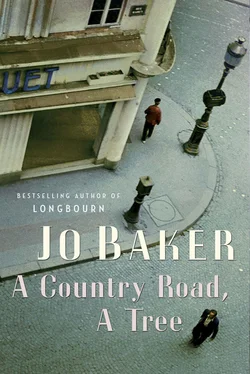“And you must come and see us there,” Mary says. “It will be a long summer if you don’t come.”
It sounds pleasant and strange, to spend the summer in Arcachon, while the war goes on elsewhere. It is impossible to think of it as real.
—
He just keeps ticking on, ticking over. He tries to work, but with Alfy gone, the translation, previously inchworm, now swallows its own tail. He cannot make it matter even to himself, not any more.
The weather turns bitter; the wind is thin, the temperature plummets. He hunches into himself. He is always cold.
In the street, strangers have an uncanny knack of looking like old friends, like people who have already gone. His sight is far from perfect: the number of times he’s raised a hand in error and, on realizing his mistake, has had to blunder on, resettling his hat, adjusting his glasses, trying to act as though nothing had really been meant by it.
Suzanne’s friends do not disperse. The younger men have joined up; the card-carrying communists have been interned for carrying their cards. But those who are still at liberty do not drift away. They belong, they’re rooted here. And they stand staring dead ahead at what is coming. They meet now with discretion, these friends, at each other’s apartments, arriving in ones and twos, leaving in a similarly staggered fashion. The government’s swiftness to intern is stunning. One does not have to do, one simply has to be.
She takes herself off to these meetings, her collar turned up and scarf wrapped against the chill. He watches her go with a needle-thin interest that he would not quite describe as jealousy. He goes along with her sometimes, when she asks him to. She doesn’t always ask him to, and he wonders if that means there will be someone there she doesn’t want him to meet, or to witness her meeting. There are former lovers drifting round the place; one doesn’t get to their age unmarried without chalking up a few. Her tennis partner in mixed doubles, for example. That fellow.
If there’s a piano in the apartment when he goes, he’ll play it. As the evening wears on, she becomes voluble and insistent and she taps the tabletop with a finger and corrects people, and even in these anxious times there are bright moments when she throws back her head and just laughs. This is her without him, unsolicitous and assertive, and he feels uneasy at it. What is he doing, letting her saddle herself with him?
Cigarette smoke blues the air, a fire glows in a grate, ashtrays fill, glasses empty. He picks out a few tunes, though listlessly, because music is not really required and he has no desire to draw attention to himself. And they talk.
Just a little fellow then, but I remember the last time round; they got within a whisker of the place. The bombing, good God, do you remember? But a whisker is not Paris: they were held at bay; they had to bomb us because they couldn’t get close enough to shoot us in the streets. Yes, but the siege of ’70, yes, it was a while ago, but the restaurants were reduced to serving rat and cat and dog and the menagerie from the Jardin des Plantes, the elephant and the giraffe and everything slaughtered there for food. There’s good eating on an elephant; I wouldn’t say no. That’s not the point: we could be there again before you know it. But things are different now! We have the line, the Maginot. Pfft. The line! Don’t talk to me about the line. The Germans are prepared, that is the thing nobody seems to understand, that while we’ve been sitting on our arses behind the Maginot line playing cards and scratching ourselves, Germany has been farting out smoke and shitting artillery. They’ll be here before you know it and they’ll fuck us properly this time. No no no, that’s alarmist nonsense: the line will hold, the army will stand its ground; the line will hold. The line will hold.
He glances up to his glass, perched on top of the upright piano. There’s just a smudge of purple in the pit of it; he glances back towards the table, and the bottles are empty. They talk in circles and wind themselves up like watch-springs. But what can they do ?
She goes to speak, and when the noise doesn’t falter she just raises her voice and continues, till the other voices fall away and she goes on. The key is to do something. Because that’s better than sitting around doing nothing. And so they have to figure out what they can do. Even if it’s only to ensure the fair distribution of elephant steaks.
Someone gets out a notebook and pencil, licks the tip; the mood shifts and becomes purposeful. But not for long, because they know that the moment they show their faces as communists they’ll be locked up, since their loyalties will be assumed to lie elsewhere. But where else now can they lie? They are on their own. Stalin has thrown his lot in with Hitler and will look the other way. There is just the queasy idea of England peering across the Channel and biting her nails, while America stands, arms folded and whistling, pretending not to notice what is going on at all.
People fall silent, and then they start to talk of other things, of their children and their grandchildren and the music and the bitterly cold winter that this is turning out to be. And they must be going. They don’t like to stay late, not nowadays. They make their farewells, pull on gloves and caps and leave in dribs and drabs, heading off into the night, hunched and blowing clouds of breath to disturb the fog.
—
Nora, in her blurry way, is moving around the apartment, carrying a coffee pot. Joyce is playing the piano and singing “The Salley Gardens.” Nora sets the coffee pot down on the hall console, then picks up a vase and moves off again on another of her aimless peregrinations. He watches her as she goes, then he picks up another book, peers at the spine, and sets it in the tea-chest. Joyce finishes the song, lights a cheroot and leaves it to smoulder, then starts to pick away at another tune. “Croppy Boy.” He is feeling sentimental. His voice sounds weak today.
The Joyces are moving out of the apartment and into an hotel. It’s supposed to make things easier, but it isn’t making anything easier yet. Paul Léon has overstepped the mark; it’s easily and inadvertently done. Just an unwelcome word about Giorgio and he has plummeted out of favour as precipitously as if he had fallen down a well. And so his help is no longer wanted here, though help is always wanted here: nothing very much gets done unless someone else does it.
Joyce’s voice trails away; his hands fall still. He closes the piano. He fishes for his stick, rises to his feet. “You’ll take a drink?” he asks.
He sets aside a book, straightens up, brushes himself down. “Mrs. Joyce won’t mind?”
“We shall be discreet. Where’s my coat?” A hand extended, a hesitant step, head cocked like a blackbird, the better to see out of the edge of his remaining vision.
—
At the café, Joyce orders white wine. He drinks as though it’s for the good of his health, sucking away at his glass with a pained expression. He talks, he drinks, he frowns, he drinks, he talks.
“What, anyway, is the use of this benighted war? I cannot see that there is any point to it at all.”
Well, there are Hitler’s incursions—
A dismissive puff. Lines on maps are there to be redrawn. The Brits can hardly get up in arms at that, now can they? They’ve pinkified half the planet.
His persecutions.
But the Jews have always been persecuted. There’s nothing new in that at all. Old as the hills, that is. I don’t see why we should have a war about that now.
Joyce doesn’t want to hear; there is no point in insisting. Instead, in the little local café on the rue des Vignes, under gaslight, the two of them foxed and yellowed by the old mirrors, their two heads bent, his a dark brush, Joyce’s pomaded and streaked with grey, he drinks. He drinks and lets the older man talk; the old accent and the light voice feel like home, and he finds himself thinking of Germany before the war, cool light, heavy pale flesh, solitude, the paintings, the bare spaces on the gallery walls. He opens his mouth sometimes and words fall like stones, and he closes his lips and resolves to keep them closed. Because Joyce is eloquent tonight, for all that he’s exhausted, and whatever he is saying there is always wonder in it, in being in the flow of his talk. Outrage at this state of affairs, the effect that all of it is having on Nora’s nerves, and Lucia’s…nerves. And Giorgio may be conscripted if he doesn’t get out of France, and the fact that his book, his book is not news now, not any more, because of this, this, this politics, and how galling it all is.
Читать дальше










